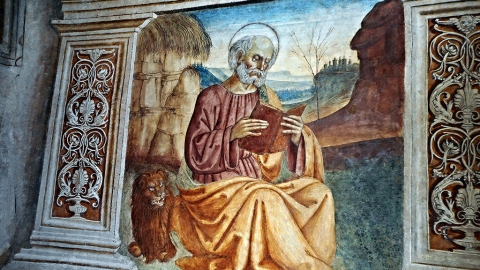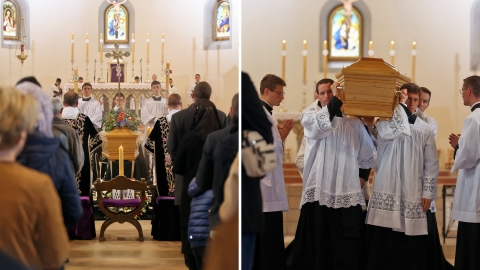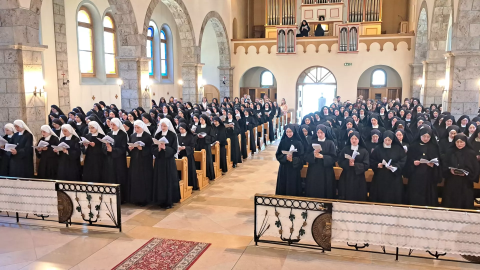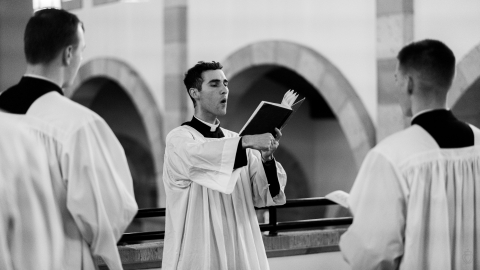A Fervent Lent - From the writings of Abbot Gueranger, OSB, in "The Liturgical Year"
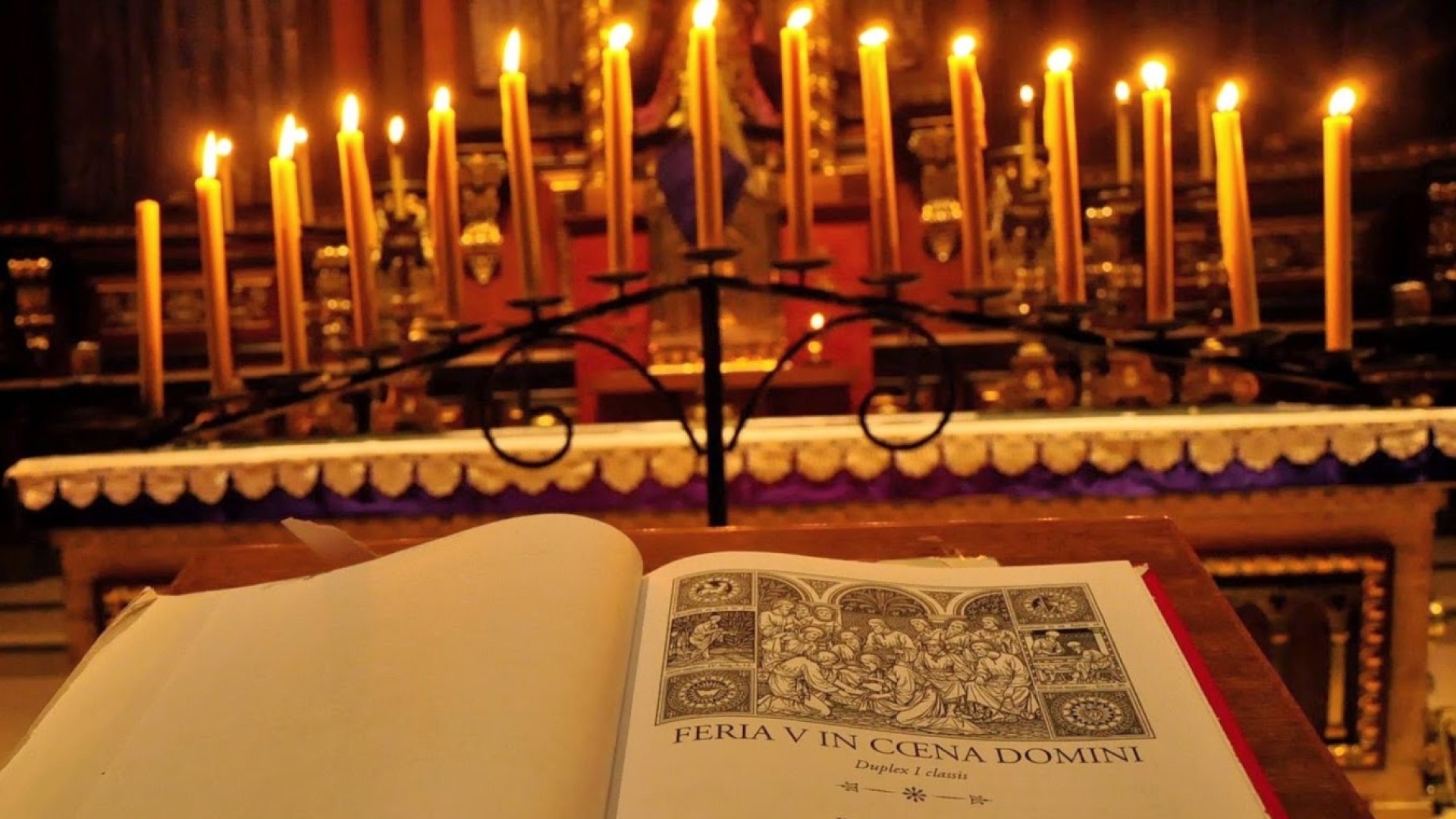
We may be sure that a season as sacred as Lent is rich in mysteries. The Church has made Lent a time of recollection and penance in preparation for the greatest of all feasts. Therefore, the Church would bring into it everything that could excite the faith of her children and encourage them to go through the arduous work of atonement for their sins.
The following are excerpts taken from Abbot Gueranger, O.S.B.'s The Liturgical Year.
The Mystery of Lent
Why Forty Days?
Let us remember the forty days and forty nights of the deluge (Num. xiv. 33) sent by God in His anger when He repented that He had made man and destroyed the entire human race with the exception of one family. Consider how the Hebrew people, in punishment for their ingratitude, wandered forty years in the desert before they were permitted to enter the promised land. (Gen. vii. 12) Listen to God commanding Ezekiel to lie forty days on his right side, as a figure of the siege that was to bring destruction on Jerusalem. (Exechiel iv. 6)…the Son of God, having become Man for our salvation and wishing to subject Himself to the pain of fasting, chose the number of forty days.
The Whole Church Offering Sacrifice for Sins
The institution of Lent is thus brought before us with everything that can impress the mind with its solemn character and with its power to appease God and purify our souls. Look beyond the little world that surrounds us and see how the entire Christian universe is, at this very time, offering forty days’ penance as a sacrifice of propitiation to the offended Majesty of God. Let us hope that, as in the case of the Ninivites, He will mercifully accept this year’s offering of our atonement and pardon us our sins.
Lent: A Christian Warfare
The number of our days of Lent is a holy mystery. Let us now learn from the liturgy, in what light the Church views her children during these forty days. The Church considers her children an immense army, fighting day and night against spiritual enemies. We remember how, on Ash Wednesday, she calls Lent a Christian warfare. In order that we may have that newness of life that will make us worthy to sing once more our Alleluia, we must conquer our three enemies: the devil, the flesh, and the world.
Triple Battle
We are fellow combatants with our Jesus, for He, too, submits to the triple temptation suggested to Him in person by Satan. Therefore, we must wear our armor and watch unceasingly. While it is of the utmost importance that our hearts be spirited and brave, the Church gives us a war-song of heaven’s own making that can fire even cowards with hope of victory and confidence in God’s help. That song is the Ninetieth Psalm. The Church inserts the entire psalm into the Mass of the first Sunday of Lent and every day introduces several of its verses into the ferial Office.
Psalm 90
There, the Church tells us to rely on the protection wherewith our heavenly Father covers us, as with a shield. She tells us to hope under the shelter of His wings and to have confidence in Him for He will deliver us from the snare of the hunter who robbed us of the holy liberty of the children of God. She tells us to rely upon the succor of the holy angels, who are our brothers, to whom our Lord hath given charge that they keep us in all our ways and who, when Jesus permitted Satan to tempt Him, were the adoring witnesses of His combat and approached Him after His victory, proffering to Him their service and homage. Let us well absorb these sentiments wherewith the Church would have us be inspired. During our six-week campaign, let us often repeat this admirable canticle that fully describes what the soldiers of Christ should be and feel in this season of great spiritual warfare.
Three Topics of Meditation
The Church puts before us three great subjects, which she will gradually unfold to us between this and the great Easter solemnity. Let us be all attention to these soul- stirring and instructive lessons.
1 - The Synagogue against Our Lord
Firstly, there is the conspiracy of the Jews against our Redeemer. It will be brought before us in its whole history, from its first formation to its final consummation on Good Friday, when we shall behold the Son of God hanging on the wood of the cross. The infamous workings of the Synagogue will be brought before us so regularly, that we shall be able to follow the plot in all its details. We shall be inflamed with love for the august Victim, whose meekness, wisdom, and dignity bespeak a God. The divine drama that began in the cave of Bethlehem will close on Calvary. We may assist at it by meditating on the passages of the Gospel read to us by the Church during these days of Lent.
2 - The Baptism: A New Birth
The second of the subjects offered to us for our instruction, requires that we should remember how the feast of Easter is to be the day of new birth for our catechumens, and how, in the early ages of the Church, Lent was the immediate and solemn preparation given to candidates for Baptism. The holy liturgy of the present season retains much of the instruction the Church used to give to the catechumens. As we listen to her magnificent lessons from both the Old Testament and the New Testament, whereby she completed their initiation, we ought to think with gratitude of how we were not required to wait years before being made children of God, but were mercifully admitted to Baptism even in our infancy. We shall be led to pray for those new catechumens, who, this very year, in far distant countries, are receiving instructions from their zealous missioners and are looking forward, as did the postulants of the primitive Church, to that grand feast of our Savior’s victory over death. Then, they are to be cleansed in the waters of Baptism and receive from the contact a new being — regeneration.
3 - Penance for Sins
Thirdly, we must remember how, formerly, the public penitents (who had been separated on Ash Wednesday from the assembly of the faithful) were the object of the Church’s maternal concern during the forty days of Lent and were to be admitted to reconciliation on Maundy Thursday, if their repentance merited this public forgiveness. We shall have the admirable course of instructions, which were originally designed for these penitents, and which the liturgy, faithful as it ever is to such traditions, retains for our sake. As we read these sublime passages of the Scripture, we shall naturally think upon our own sins and on what easy terms our sins were pardoned. If we had lived in other times, we might have been put through the ordeal of a public and severe penance. This will excite us to fervor for we shall remember that, whatever changes the indulgence of the Church may lead her to make in her discipline, the justice of our God is ever the same. We shall find in all this an additional motive to offer the sacrifice of a contrite heart to His Divine Majesty and we shall go through our penances with that cheerful eagerness, which the conviction of our deserving much harsher penance always brings with it.
Practice During Lent
During these forty days of penance, which seem so long to our poor nature, we shall not be deprived of the company of our Jesus.
Example of Our Lord
It is our Emmanuel, the same Jesus, but not under the form of the sweet Babe whom we adored in His crib. He has grown to the fullness of the age of man and wears the semblance of a sinner. Here He is — trembling and humbling Himself before the sovereign Majesty of His Father whom we have offended, and to whom He now offers Himself as the Victim of propitiation. He loves us with a brother’s love and, seeing the season for doing penance has begun, He comes to cheer us on with His presence and by His own example. We are going to spend forty days fasting and abstaining. Jesus, who is innocence itself, goes through the same penance.
Jesus withdraws from the company and sight of men. We intend to assist at the divine services more assiduously and to pray more fervently than at other times. Jesus is suppliant and all for us. We will think over our past sins and bewail them in bitter grief. Jesus suffers for our sins and, as though He Himself had committed them, weeps over them in the silence of the desert.
Forty Days in the Desert
No sooner had He received baptism from the hands of Saint John, than the Holy Ghost led Him to the desert. The time had come to show Himself to the world. He would begin by teaching us a lesson of immense importance. He leaves the saintly Precursor and the admiring multitude that had seen the Divine Spirit descend upon Him and that had heard His Father’s voice proclaiming Him to be God’s beloved Son. He leaves them and goes into the desert. A rugged mountain rises not far from the Jordan. It has received, after ages, the name of Quarantana. It commands a view of the fertile plain of Jericho, the Jordan, and the Dead Sea. The Son of God now enters a cave on that wild mountain. His only companions are the dumb animals who have chosen this same cave for their own shelter. He has no food wherewith to satisfy the pangs of hunger; the barren rock can yield Him no drink, and His only bed must be of stone. Here, He is to spend forty days. After forty days, He will permit the angels to visit Him and bring Him food.
He has borne all its fatigues and hardships so we, when called upon to tread the narrow way of our Lenten penance, will have His example to silence the excuses, sophisms, and repugnances of self-love and pride. The lesson here is given too simply to be misunderstood.
You Shall perish!
The law of doing penance for sin is also clearly shown and we cannot plead ignorance. Therefore, we must honestly accept and practice the teaching. Jesus leaves the desert where He spent the forty days and addresses all men with these words, “Do penance, for the kingdom of heaven is at hand.” (Matt. iv. 17) Let us not harden our hearts to this invitation, lest there be fulfilled in us the terrible threat contained in those other words of our Redeemer: “Unless you shall do penance, you shall perish.” (Luke xiii. 3)
What is Penance?
Penance consists of contrition of the soul and mortification of the body; both parts are essential to penance. The soul has willed the sin and the body has frequently cooperated in its commission. Moreover, man is composed of both soul and body. Both, then, should pay homage to their Creator. The body is to share with the soul either the delights of heaven or the torments of hell. Therefore, there cannot be any thorough Christian life or any earnest penance where the body does not take part, in both, with the soul.
Most Important Point
Yet, it is the soul that gives reality to penance. The Gospel teaches this by the examples it holds out to us of the prodigal son, of Magdalene, of Zaccheus, and of Saint Peter. The soul, then, must be resolved to give up every sin. The soul must heartily grieve over those she has committed. The soul must hate sin. The soul must shun the occasions of sin. The sacred Scriptures have a word for this inward disposition, which has been adopted by the Christian world and which admirably expresses the state of the soul that has turned away from her sins. The word is conversion. The Christian should, therefore, during Lent, study to excite himself to this repentance of heart and look upon it as the essential foundation of all his Lenten exercises.
Mortification of the Body
Nevertheless, he must remember that this spiritual penance would be a mere delusion, where he not to practice mortification of the body. Let him study the example given him by his Savior, who grieves, indeed, and weeps over our sins; but He also expiates them by His bodily sufferings. Hence, the Church, the infallible interpreter of her divine Master’s will, tells us that the repentance of our heart will not be accepted by God unless it is accompanied by fasting and abstinence.
Prayer
The courageous observance of the Church’s precept of fasting and abstaining during Lent must be accompanied by those two other eminently good works, to which God so frequently urges us in the Scripture: prayer and almsdeeds. Just as under the term “fasting” the Church comprises all kinds of mortification, under the word “prayer” she includes all those exercises of piety whereby the soul holds intercourse with God. Those exercises include frequent attendance at the services of the Church, assisting at daily Mass, reading spiritual books and information, meditating upon eternal truths and the Passion, hearing sermons, and, above all, approaching the sacraments of Penance and the Holy Eucharist.
Works of Mercy
Almsdeeds comprise all the works of mercy towards our neighbor and are unanimously recommended by the holy doctors of the Church as the necessary complement to fasting and prayer during Lent. God has made it a law, to which He has graciously bound Himself, that charity shown towards our fellow creatures, with the intention of pleasing our Creator, shall be rewarded as though it were done to Himself. How vividly this brings before us the reality and sacredness of the tie that He wants to see existing between all men! Indeed, it is such a requirement that our heavenly Father will not accept the love of any heart that refuses to show mercy. On the other hand, He accepts as genuine and as done to Himself the charity of every Christian, who, by a work of mercy shown to a fellowman, is really acknowledging and honoring that sublime union that makes all men be one family with God as its Father. Hence it is that almsdeeds, done with this intention, are not merely acts of human kindness, but they are raised to the dignity of acts of religion, with God as their direct object, and they have the power of appeasing His divine justice.
Alms
Let us remember the counsel given by the Archangel Raphael to Tobias. He was on the point of taking leave of this holy family and returning to heaven and these were his words, “Prayer is good with fasting and alms, more than to lay up treasures of gold. For alms delivereth from death and the same is that which purgeth away sins and maketh to find mercy and life everlasting.” (Tobias xii. 8-9) Equally strong is the recommendation given to this virtue by the Book of Ecclesiasticus: “Water quencheth a flaming fire and alms resisteth sins.” (Eccles. iii. 33) And again, “Shut up alms in the heart of the poor and it shall obtain help for thee against all evil.” (Eccles. xxix. 15) The Christian should keep these consoling promises always before his mind, but more especially during, the season of Lent. The rich man should show the poor, whose whole year is a fast, that there is a time when even he has his self-imposed privations. The faithful observance of Lent naturally produces a saving — let that saving be given to Lazarus. Nothing, surely, could be more opposed to the spirit of this holy season, than keeping up a table as richly and delicately provided as at other periods of the year, when God permits us to use all the comforts compatible with the means He has given us. But how thoroughly Christian is it that, during these days of penance and charity, the life of the poor man should be made more comfortable, in proportion to what the rich share in the hardships and privations of his suffering brethren throughout the world! Poor and rich would then present themselves, with all the beauty of fraternal love upon them, at the divine Banquet of the Paschal Feast, to which our risen Jesus will invite us after these forty days are over.
Separation from the World
There is one means more whereby we are to secure to ourselves the great graces of Lent. That is the spirit of retirement and separation from the world. Our ordinary life, such as it is during the rest of the year, should all be made to pay tribute to the holy season of penance. Otherwise, the salutary impression produced on us by the holy ceremony of Ash Wednesday will soon be effaced. The Christian ought, therefore, to forbid himself, during Lent, all the vain amusements, entertainments, and parties of the world he lives in.

